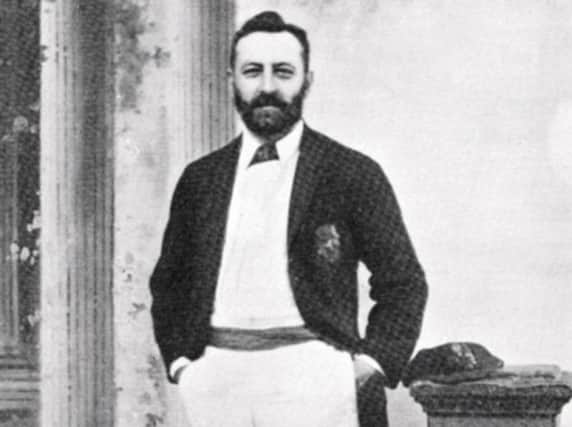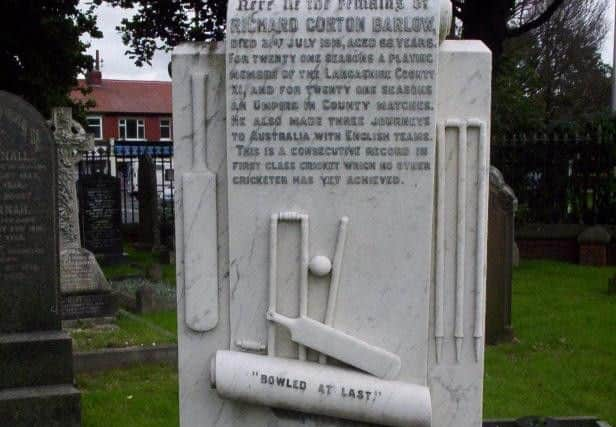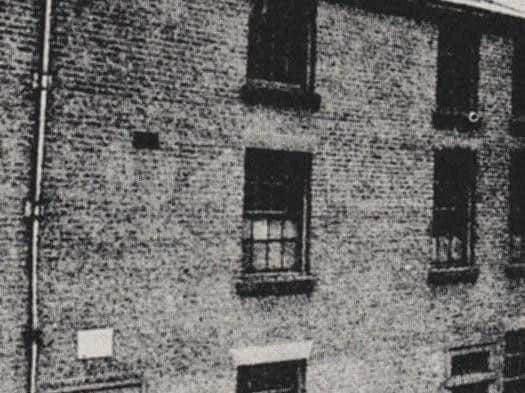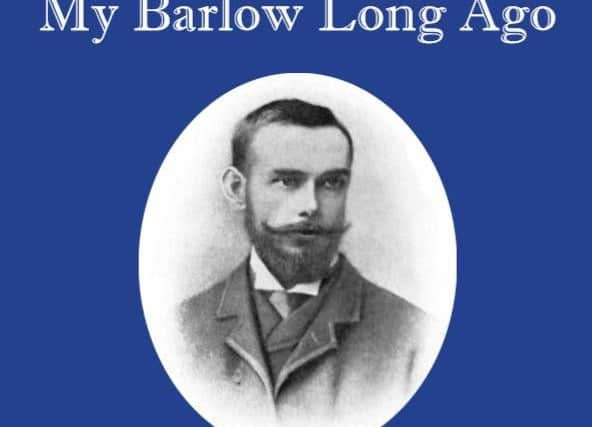Memory Lane: The troubled life of poet Francis Thompson


It is little I repair to the matches of the Southron folk,
Though my own red roses there may blow;
It is little I repair to the matches of the Southron folk,


Though the red roses crest the caps, I know.
For the field is full of shades as I near the shadowy coast,
And a ghostly batsman plays to the bowling of a ghost,
And I look through my tears on a soundless-clapping host


As the run-stealers flicker to and fro.
To and fro;
O my Hornby and my Barlow long ago!
The last line of the above, an excerpt from one of the most famous of all cricketing poems, O My Hornby and My Barlow Long Ago. It forms the intriguing title of the latest book from one of our regular contributors, local historian, Kenneth Shenton.


Advertisement
Hide AdAdvertisement
Hide AdDrugs, decadence, poetry and cricket all feature strongly as this volume examines in detail the extremely troubled life of the poem’s creator, Preston’s visionary poet, Francis Thompson, born 160 years ago this year.
In addition, the author also looks at the lives and careers of those two larger than life Victorian sporting superstars the poet so famously immortalised in verse, Lancashire cricketer’s, Albert Neilsen Hornby and Richard Gorton Barlow. The latter, who died exactly 100 years ago, made the county his home. His grave, complete with ball and broken stumps, remains one of the most distinctive in Layton Cemetery.
Born at 7 Winckley Street, Preston, on December 18 1859, the son of a local doctor and a devout Roman Catholic convert, Francis Joseph Thompson’s consumptive nature sadly led him to a lifetime of drug addiction. Having studied for the priesthood at Ushaw College, Durham, he was then surprisingly rejected as unsuitable for ordination.
Subsequent medical studies at Owen’s College, Manchester, proved even more problematical. Trapped in a career for which he was unsuited, he sought both solace and inspiration in local art galleries, libraries and, not least, spent countless hours watching his many cricketing heroes at Old Trafford.
Advertisement
Hide AdAdvertisement
Hide AdUnlikely ever to pass his medical exams, and increasingly dependent on drugs such as opium, following a series of family arguments, he then fled in disgrace to settle in London. With no income for a number of years he was forced to live as a vagrant. By 1887, now on the verge of suicide, he was rescued by a prostitute who nursed him through that harsh and bitter winter.
It was her later mysterious disappearance and his frenzied attempts to find her that inexorably implicated Thompson in the notorious Whitechapel murders of August, 1888, when five prostitutes died at the hands of that infamous murderer, Jack the Ripper.
Not a moment too soon salvation came in the form of literary editor, Wilfrid Meynell and his wife, Alice, who were so impressed by Thompson’s contributions to their literary magazine that they made determined efforts to seek him out.
Appalled at what they found, they subsequently became his guardians, provided him with a home and persuaded him to undergo urgent medical treatment. Now, for an all too brief period of time, shut away in monasteries, initially at Storrington in Sussex and then at Pantasaph in North Wales, relatively free of drugs, the visionary poet produced the bulk of his finest work. Among three outstanding collections of poetry, for many his finest work has long remained The Hound of Heaven.
Advertisement
Hide AdAdvertisement
Hide AdToday, hugely popular throughout America and translated into more than 60 languages, everything from Afrikaans to Zulu, The Hound of Heaven has become one of only a handful of English religious poems to appeal to all nationalities and faiths. It was in 1919, again exactly 100 years ago, that William Harris, then a young unknown organist, set the work for vocal soloist, chorus and orchestra. Highly praised at the time, this extensive offering won the composer a prestigious Carnegie Award. Countless other composers and artists worldwide, have since followed suit.
Tragically all too soon after returning to live in London, Francis Thompson could not resist reverting to his old ways. Increasingly infirm, he died on November 13. 1907, aged only 47 and is buried at Kensal Green Cemetery, only a few hundred yards from the house in which he completed The Hound of Heaven. Five years later Preston took the lead in becoming home to a thriving Francis Thompson Appreciation Society. In the years prior to the First World War, Thompson’s poetry sold in huge numbers, never more so than throughout America. Today, thanks in no small part to the enduring exploits of that intrepid duo, Hornby and Barlow, his rich legacy lives on.
To the Old Trafford crowds of the 1870s and 1880s, the sight of Hornby and Barlow emerging down the pavilion steps at Old Trafford set the air alight with expectation. Hornby, the ebullient amateur, slight of stature, fair and bare-headed, was a hard-hitting, highly aggressive opening batsman who, often to the despair of his partner, had a particular penchant for quick singles.
Barlow, dark and bearded, much more thickly set than his captain, was noted as a careful, often dour, accumulator of runs. As individuals, they were markedly different, as a pair, they were unique.
Advertisement
Hide AdAdvertisement
Hide AdBorn at Barrow Bridge, Bolton in May, 1850, Richard Gorton Barlow, this honest yeoman all-rounder, provided the perfect foil to his more flamboyant partner.
First playing for Lancashire in 1871, over the next 21 seasons, Barlow scored almost 9,000 runs and took 754 wickets. Uniquely, in 1882, he topped both the county’s batting and bowling averages, the only man ever to do so. Capped 17 times by England, he also undertook three epic tours of Australia.
After leaving Lancashire, Barlow established a successful sports goods business while also going on to become a famous cricket umpire.
Making Blackpool his home, here he coached at Arnold School, turned out regularly for the local team and also played soccer for Manchester City. It was in the resort each summer that he would organise and promote popular exhibition games involving a Lancashire County XI that took on a distinguished England XI. An equally distinguished football referee, he officiated in the FA Cup game when Preston North End beat Hyde United by a resounding 26-0.
Advertisement
Hide AdAdvertisement
Hide AdAmong the first collectors of cricketing ephemera, Barlow’s elegant home, Alderlea in Raikes Parade, complete with armorial bearings, became a veritable cricket museum.
Adorning the spacious vestibule was a beautiful stained glass window picturing Hornby, Barlow and Lancashire colleague, wicket keeper Dick Pilling, crouching behind like a guardian angel, now housed at Old Trafford.
Pictures of cricketers, past and present, adorned the impressive entrance hall, the cavernous bathroom, a repository for his ever increasing collection of cricket bats and trophies.
Having sold his impressive house to a local doctor, Barlow then built a new smaller family home, Glen May, in Alderlea’s once extensive rear garden.
Advertisement
Hide AdAdvertisement
Hide AdThere, his initials, elegantly intertwined, still remain visible above the imposing front door. Living close by was his daughter, now married and with a young son christened perhaps appropriately, Leslie Barlow Wilson.
In 1913, Barlow would move again, settling closer to Stanley Park in Woodland Grove. Three years earlier, despite his seemingly idyllic marriage of almost 40 years, he had begun a brief affair with a local girl he met one day while out walking on the promenade. As a result, he fathered a son, Reginald Gorton Barlow Thompson.
Not enjoying the best of health in his later years, Richard Barlow crowned his life with a characteristic flourish by designing his own tombstone.
His self-penned epitaph modestly records:
Here lie the remains of Richard Gorton Barlow, died 31 July 1919, aged 68 years. For 21 seasons a playing member of the Lancashire County Cricket XI and for 21 seasons an umpire in county matches. He also made three journeys to Australia with English teams.
Advertisement
Hide AdAdvertisement
Hide AdThis is a consecutive record in first class cricket which no other cricketer has achieved.
Born in Blackburn in February,1847, the son of the local Member of Parliament, Albert Nielsen Hornby, always affectionately known as Monkey to his contemporaries, was a real Boy’s Own character. Educated at Harrow School, he originally intended to go to Oxford University but changed his mind when told that he would be expected to do some work.
First playing for Lancashire in 1867, he became a regular member of the side two years later. In 1881, Hornby himself topped the national batting averages, outscoring even the legendary W G Grace.
Winning three test caps, 12 months later, he famously captained England against Australia at the Oval when their shock defeat, albeit by only seven runs, was heralded as the death of English cricket. That same year, he also became one of only two sportsmen to captain England at both cricket and rugby, winning, in all, nine international caps. For good measure he also played soccer for Blackburn Rovers, once scoring a goal in an FA Cup tie.
Advertisement
Hide AdAdvertisement
Hide AdCaptaining Lancashire for 12 seasons from 1880 until 1891 and later, in 1897 and 1898, in all, he led them to four championships, winning two outright. Finally retiring in 1899 at the age of 51, throughout his long and illustrious career, he totalled 10,649 runs, including 16 centuries. President of the county from 1894 until 1916, in a typically active retirement in Cheshire, very much the country squire, here he kept a fine stud of hunters, rode to hounds and laid a cricket pitch alongside his impressive country house. He died at his Nantwich home in December, 1925.
He would like to have added a great deal more, of course, but sadly, there was just not enough room. Instead, inscribed lower down are just three words: Bowled At Last.
O My Hornby and My Barlow Long Ago: The Life of the Poet Francis Thompson 1869-1907 by Kenneth Shenton is published by Max Books and available From www.max-books.co.uk priced £9.95.